ANAHEIM INTERNATIONAL FILM FESTIVAL: Film Festivals and Taco Trucks
Over the past month my films have screened in a variety of circumstances—the kind of variety that is more demoralizing than exhilarating, the kind of variety that makes one wonder if there’s such a thing as an ideal screening. It’s true that I’m not a prominent filmmaker, even in the no-budget “DIY” universe, but I’m fairly prolific, and this has resulted in my second feature playing in Southern California within two days of my third feature playing elsewhere in Southern California. The juxtaposition was enlightening.
Babnik, my third feature, was invited to screen as part of UCLA’s Melnitz series in mid-October. Melnitz programmer Phil Coldiron pulled no punches when approaching me about the screening opportunity, mentioning up front that Pedro Costa and Tsai Ming-liang had recently brought their films for screening and discussion. That was that. Coldiron was flexible enough to choose a date that coincided with a screening of Canary, my second feature, at Anaheim International Film Festival. Thus I was able to kill two birds with one particularly memorable rental car.
I won’t be surprised if you haven’t heard of Anaheim’s film festival—a year ago there was no film festival there. A fresh-faced young man named Josh Bednarsky put it together in a matter of months with the help of some distinguished “consultants” from an outfit called FestWorks.
The FestWorks team might look familiar to those ensconced in the film festival milieu. Robert Koehler, Rose Kuo and John Wildman left AFI Fest early this year and formed a partnership, which according to their press release “provides a one-stop service” for festivals in search of programming, publicity, the works, as it were. As of July, Kuo is busy running the Film Society of Lincoln Center, but Koehler and Wildman were all over the Anaheim fest, making their presence felt while introducing screenings and moderating panels. Their combined experience was palpable and set the tone for the entire festival, supporting an eclectic lineup of films selected by programming director Matt Bolish, also of FestWorks. The sort of what-have-we-gotten-ourselves-into hysteria which accompanies most newborn film festivals was nowhere to be found in Anaheim. The only thing lacking was an audience.
AIFF was held at UltraStar Cinemas, part of Garden Walk just outside the Disneyland compound. I was told that the 14-screen UltraStar Cinemas, which canceled bookings of current releases such as The Social Network in order to host the film festival, had recently changed ownership. One sensed the institutional hesitation which accompanies a reboot. More than half the auditoriums were fallow during fest screenings. One of the auditoriums houses a defunct IMAX screen. Some of the auditoriums have deep empty spaces perfect for sprawling panels or brunches, others have plush sofa-like seating with flared cupholders serving as partial tables. Forgive the detail here, but I’m not one for shoddy festival venues, and this palace was a marvel.
Now I should talk about the films at AIFF before getting back to more existential questions.
Watching the Rohmer-inspired foibles of the obscure film director in Hong Sang-soo’s Like You Know It All was a bit disconcerting—he was on a festival panel, even. However, even while writhing I was oddly reassured by the cigarette burns in the upper right-hand corner of the 35mm image. The previous night I’d seen another film done in the same de reiguer SoKo style—patient master shots of people talking uninsistently—but it was projected from a watermarked festival screener copy. The leading James Brooks-like title, I’m in Trouble (possibly a translator’s indiscretion), was insufficient to coach me through such a lethargic rendering of wispy goings-on.
I lamented that Guy and Madeline on a Park Bench was screened digitally despite having been shot on film—an ambitious, touching, generally unlikely work, with images so delicately composed and exposed on black and white Eastman Kodak Double-X Negative Film 7222 (their press release expresses reasonable pride in subverting the digital revolution) that it’s impossible not to cringe and writhe at their degradation through digital hardware. The problem is that if you provide a festival with a Blu-ray screening copy of your 16mm film, you end up with something that looks worse than properly posted standard definition digital video. If you take pride in shooting on film, you absolutely must screen on film. (Incidentally I provided a six-hundred-dollar HD-Cam tape which did not look or sound as good as the $20 Blu-rays I saw projected for many of the screenings.)
I had high hopes for Samson and Delilah while caught up in the mesmerizing first shot, but after the first act it descended into misery porn cliché. I was surprised to find the opening night film Wild Target so delightful. Directed by career achievement honoree Jonathan Lynn, this comedy of assassins’ manners is packed with tidy flourishes. Bill Nighy, it seems, is the anti-Peter Sellers. When he gently nudges a pistol into the feathers of a chatty parakeet, he demonstrates the difference between wit and ham. The chemistry between Nighy and Emily Blunt is suitably provocative. Not only does this film chomp amply into the market share of, say, In Bruges, but it also effortlessly one-ups a handful of manic-pixie-dream-girl flicks without quite becoming a metacomment on that genre.
Perpetuum Mobile was my favorite of the few features I saw. No doubt influenced by Pedro Costa, director Nicolas Pereda slowly unfurls the lethargic squalor of a Mexican barrio with minimal drama and statement-making. What impressed me most was the easy confluence of the two dominant art film styles of the past decade—the handheld follow-cam of the Dardennes is butted up against uninflected static wide shots. Both work, and they work together. My two companions and I were the only people in the auditorium, but Koehler gamely introduced, noting a recent Venice win for Pereda’s subsequent film.
This first edition of AIFF was brief and under-attended, dramatically punctuated by a closing night awards ceremony at Disneyland in which Paul Sorvino honored his daughter Mira and Robbie Coltrane honored Jonathan Lynn. Between acceptance speeches, cellos were raucously played and ballets meticulously performed by dozens of dancers. Not surprisingly there was a castle on the stage, flanked by buxom blondes in glistening gowns.
The first iteration of a film festival gives one a chance to reflect on really basic components of the universal template. But I should admit I’m skeptical of the film festival model in the first place. I don’t leap at every screening opportunity—I often turn down requests for screeners. This unpopular policy was the centerpiece of a three-day conversation I had with filmmaker and critic Dave McDougall before and after my time in Anaheim. McDougall pointed out that I’m reverse gatekeeping, actively preventing people from seeing my films. I realized that this instinct is paternalistic—instead of protecting my film from insensitive viewers, I’m protecting viewers from what may be a dissatisfactory viewing experience. I do not believe in methodical promotion. I make a lot of noise on Twitter but I don’t make Facebook event pages, I don’t send posters or promotional materials to fests screening my work, I rarely cut trailers. Am I lazy? Superior? Do I deserve to screen at festivals if I seem indifferent to the ritual requirements of the institution? I should mention here that I’m grateful for every screening opportunity I’ve been offered, regardless of my seeming recalcitrance.
The Melnitz series at UCLA is decidedly not a film festival. The advantages and disadvantages of one-off screenings are readily apparent to those who are used to the festival package. There’s little infrastructure for publicity, no safety net of provided lodging or victuals, but a university screening series tends to have a ready-made audience and a legacy, and the showcasing of one film and its maker results in a comprehensive Q&A. The audience for the Melnitz screening of Babnik was more than ten times as large as the audience for my two AIFF screenings and probably ten times as engaged with the film, if the post-screening discussion was any indication. If I may say so, Babnik is a lesser film than Canary. But Melnitz has an audience prepared for a certain kind of experience and Anaheim does not. Yet.
Glorifying the Melnitz model, however, vindicates McDougall’s quip that “maybe you’ll qualify for a MoMA retrospective in twenty years.” This digs at something most artists readily admit: being re-discovered is more beguiling than being discovered. If longing to be discovered is crassly self-important, longing to be re-discovered seems ascetic and noble by contrast.
What does Joe Indie want from a festival screening? If he’s strategically minded, Joe plays at a festival that has a relationship with trade journals like Variety so he can qualify for a review that has some currency. If Joe’s feature is one of three that is selected for review, he wins. Right? Or is it about “eyeballs,” that disturbing term for audience-as-commodity? Or does Joe go to as many festivals as he can in the interest of meeting like-minded people, usually fellow filmmakers, who might provide support or collaboration on his ill-advised career path. (I don’t want to dignify the possibility that Joe is aiming for festival screenings in order to sell his film to a distributor in the audience.) If Joe doesn’t have a clear answer to this question of why he’s screening at festivals, he may not know exactly why he’s making films in the first place. Which doesn’t necessarily mean he should stop making them.
Maybe I shouldn’t be asking what the filmmaker wants but what the audience wants.
I had an encounter at Anaheim that was unlike any other film festival encounter. After the second screening of Canary, I was sitting outside with a friend and a colleague when a young woman approached. “Ale–? Ale–?” “Alejandro,” I offered. “Hello, Alejandro. My name is Min-ji. I saw your film Canary.” This guileless young woman then asked for a seat and proceeded to explain that she’d come to see the Hong film (Like You Know It All) and had mistaken the day of the screening. “Luckily I saw Canary instead.” An extremely sensitive viewer, she described certain scenes in my film in meticulous detail and asked about their intended meaning. Among other bold, lucid remarks, she said, “The camera in your film is breathing.” She explained that in Korea she had edited video in her high school filmmaking club but had been unable to find any recreational filmmaking communities in the Anaheim area. After five years in the US she was now eligible for citizenship and would be made a US citizen the following day. We spoke for a half-hour. It’s ludicrous to call this networking but it wasn’t exactly engaging with my audience either. It was somewhere in between, a space Min-ji was defining as a guileless first-time film festival attendee. “Are there more film festivals like this?” she asked. We smiled at her naivete, but over the following days I found myself tormented by the notion that all film festivals are “like this.” Do we want consistency? Probably. Do we want the consistency to yield a smooth, franchised texture? I’m not so sure.
In North Carolina many years ago I stumbled across a community center showing a print of La Strada. The place was packed. The enthusiastic young academic introducing the film insisted on its greatness. Everyone politely remained (it was the South, and most were old). Afterward the young academic again insisted on the film’s greatness. Everyone quietly left. I remember that night very clearly—not to say profoundly—and I’m sure I’m not the only one. Is that event what we need more of? Is that better than a film festival? Should we be dependent on community goodwill and happenstance instead of corporate sponsors and up-to-the-minute programming? I don’t presume to have answers, but I think we should be mindful of these questions.
EPILOGUE:
I was on a panel at Anaheim. I’ve been known to scoff at the panel culture which is taking over film festivals these days, but I was relieved to find this panel simply addressed “Directing” and nothing along the lines of “Where We Go From Here” or “How To Get Financing From Strangers” or “How To Distribute Your Film Despite The Fact That Nobody Watches Films Anymore.” And so a few of us talked about directing. I talked about ingenuity. I talked about ego. I talked about all the things I believe in that have nothing to do with distribution or budgets or the future of the industry but with much more fundamental things like WHY THE HELL ARE YOU MAKING A FILM IN THE FIRST PLACE. I faced off with another director on the panel—we were fortunate to have each other as foils in order to create some tension for those present—and we tried to sum each other up in pejorative terms in order to validate our respective orientations to this independent filmmaking affliction. After I said “Those are the most alienating pronouncements I’ve ever heard,” the Other Guy came up with a useful analogy to cool things off. He said he wanted to open one restaurant and have it be the best restaurant of its kind in the area—everyone would know about it, everyone would come to it. He said that my filmmaking philosophy and methodology seemed to resemble something along the lines of a taco truck, that I wanted to serve something small and functional and not worry about the durability or sustainability or reputation of what I was offering. And I have to admit there’s something alluring about this analogy. After all, my name is Alejandro and I like tacos.
— Alejandro Adams







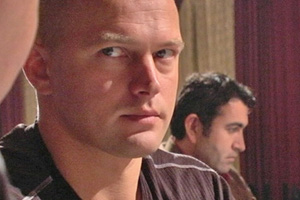

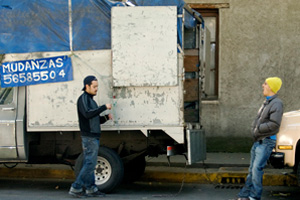
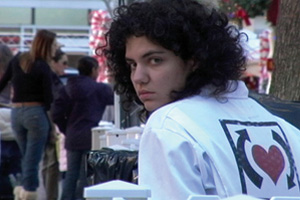

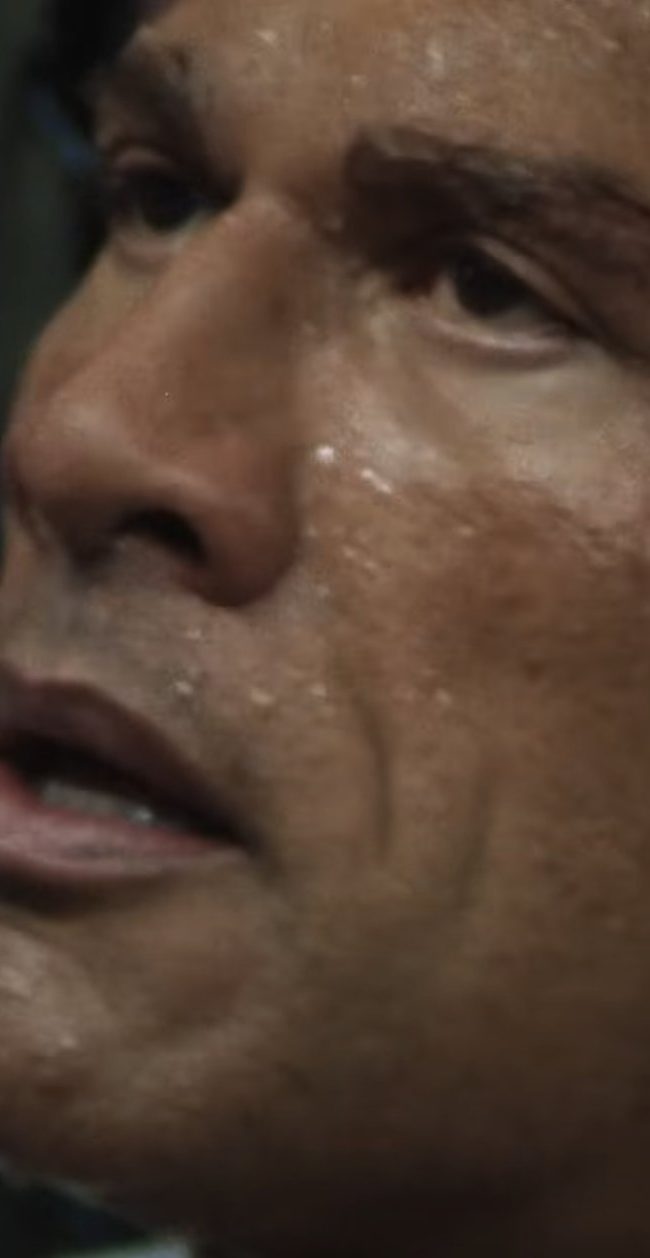
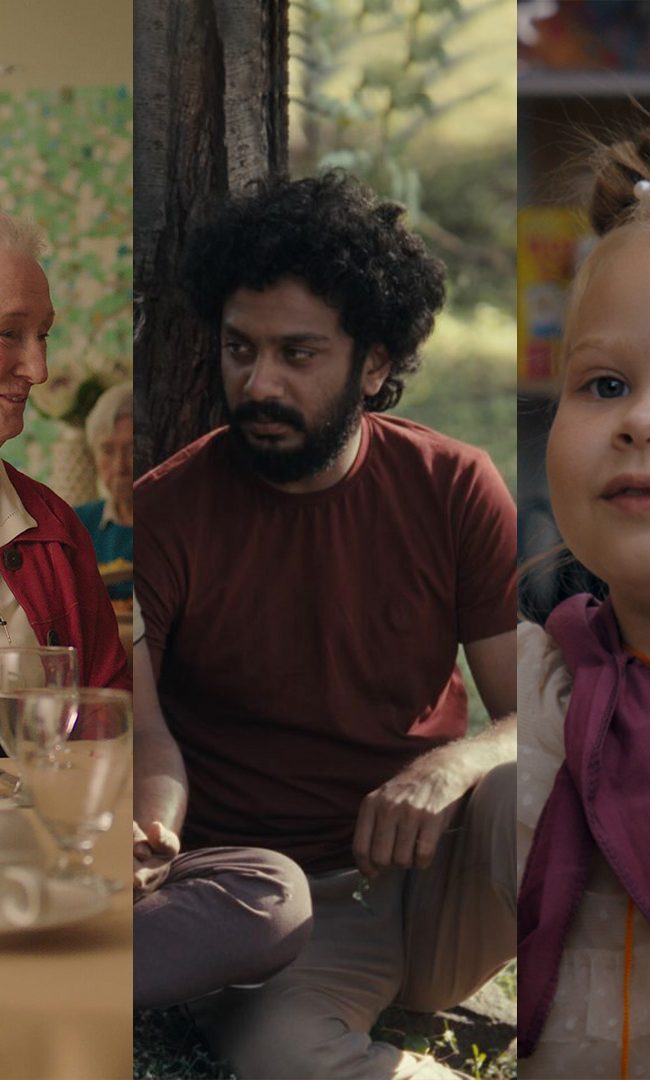


Mike
well stated. i have the same taco truck mentality, except i call it thrift store filmmaking.
Richard - The Camera Dolly Guy
You remind me how persistent you have to be to get noticed in this business.
Thumbs up man!